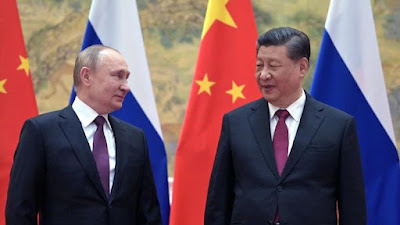Filenews 22 March 2022
Minxin Pei's
Any hopes that US President Joe Biden could convince his Chinese counterpart, Xi Jinping, to help stop the war in Ukraine, should logically have already been shelved. China wants to see an end to the conflict as soon as possible. It will not, however, use its specific weight to achieve this.
Parallel monologues
Biden and Xi appear to have conducted parallel monologues when they spoke on the phone last Friday. In the press release on their communication, the White House argued that Biden focused on Ukraine and warned of consequences for China if it provides Russia with "material support" in its war.
The Chinese official "summary" of the conversation, on the other hand, quickly overtook the Issue of Ukraine, focusing on Biden's commitment to the "one-China" policy (a reference to taiwan's non-recognition as an independent state) and the US president's promise not to engage in a new "Cold War" with China.
This is not because China, as some officials in Beijing apparently believe, gains from keeping its distance while the US and Russia are exhausted in a protracted conflict in Europe. In fact, China suffers losses every day on which the fighting continues. The only question is how much damage it will suffer and how quickly.
The "station" of February 4th
China is in this difficult position to a large extent due to the joint Sino-Russian declaration on the strategic partnership signed by Moscow and Beijing on 4 February. At that time, many in Beijing and elsewhere in the world viewed the agreement as a geopolitical masterpiece.
To have Russia as an almost strategic ally would be a clear strategic gain for China. Moreover, tensions between Russia and the US would likely force Washington to divert resources and attention away from the Indo-Pacific, giving China greater freedoms in the region.
Now, the poor performance of the Russian army on the battlefield and the unified response of the US and its allies to Russia's invasion of Ukraine have largely overturned this calculation. Instead of a lightning-fast victory, Putin risks a humiliating defeat or a quagmire, at the same time as Western sanctions will cripple the Russian economy.
The first would be the worst nightmare for China. The strategic consequences of such an outcome are inconceivable for Beijing. Putin undoubtedly understands this - and that may be one reason why he is willing to pull China into the conflict by asking it for military help.
A protracted war would be slightly less destructive for Beijing. A Russian quagmire could at least give Chinese leaders some time to rethink their strategy. An exhausted Russia, however, would also increase pressure on China to provide it with more assistance.
Risks
Open support for Putin at this time could tip the balance on the ground for Russia's benefit, at least so much so that it subsequently accepted a ceasefire and a negotiated settlement. The risks of such assistance, however, are certainly very great.
The fact is that China is moving on a different schedule than Russia. Unlike Putin, Xi believes that the current international order, although not at all satisfactory for Beijing, still leaves enough room for China to increase its power and influence. If tensions with the US can be addressed well enough to avoid an early conflict, time is theoretically on China's side. Its stronger economic growth momentum than the US would logically gradually tip the balance of power in the world to Beijing's advantage.
Support for Putin's war efforts could precipitate a direct confrontation with the West, for which China is not prepared. As problematic as China's ties with the US, Europe and Japan may be, Beijing still needs access to their markets: these three partners accounted for 52% of China's total foreign trade in 2021, compared to 3.8% represented by Russia. China is also heavily dependent on advanced Western technology, particularly in microchips, while its large corporations and banks do not yet have the luxury of being cut off from the dollar.
At the same time, Xi certainly feels he can't abandon Putin. An attempt to pressure the Russian leader to compromise quickly could fail, which would be a huge loss of prestige for Beijing. Or it could succeed, but make Putin hostile to China or weaken him at home so much that his power in Moscow is threatened.
No alternative is beneficial
Without any beneficial alternative whatsoever, the only strategy for China to deal with the current situation at the moment is to do everything in its power to help Russia, without, at the same time, violating the US red lines.
This is not a zero-cost position. China's support for Putin has seriously tarnished its international image. It deepens tensions with the US, fuels the narrative that a Sino-AMERICAN confrontation is inevitable, and increases the risk that it will erupt before China is ready to respond successfully.
Even more worrying is that China is losing ground in Europe. If the major European countries were until recently ambivalent about choosing a side in the Sino-American confrontation, China's embrace with Putin made such a strategic neutrality impossible. In the coming years, Brussels will almost certainly get closer to Washington.
What seemed like a brilliant move a few weeks ago is increasingly like a miserable strategic decision. Instead of taking advantage of the Russian-American tension, China is at the mercy of events and its long-term strategy is put at serious risk. Whoever wins in Ukraine, China has already suffered irreparable losses.
Source: BloombergOpinion
